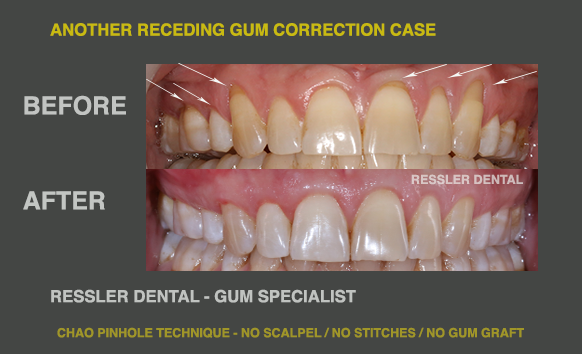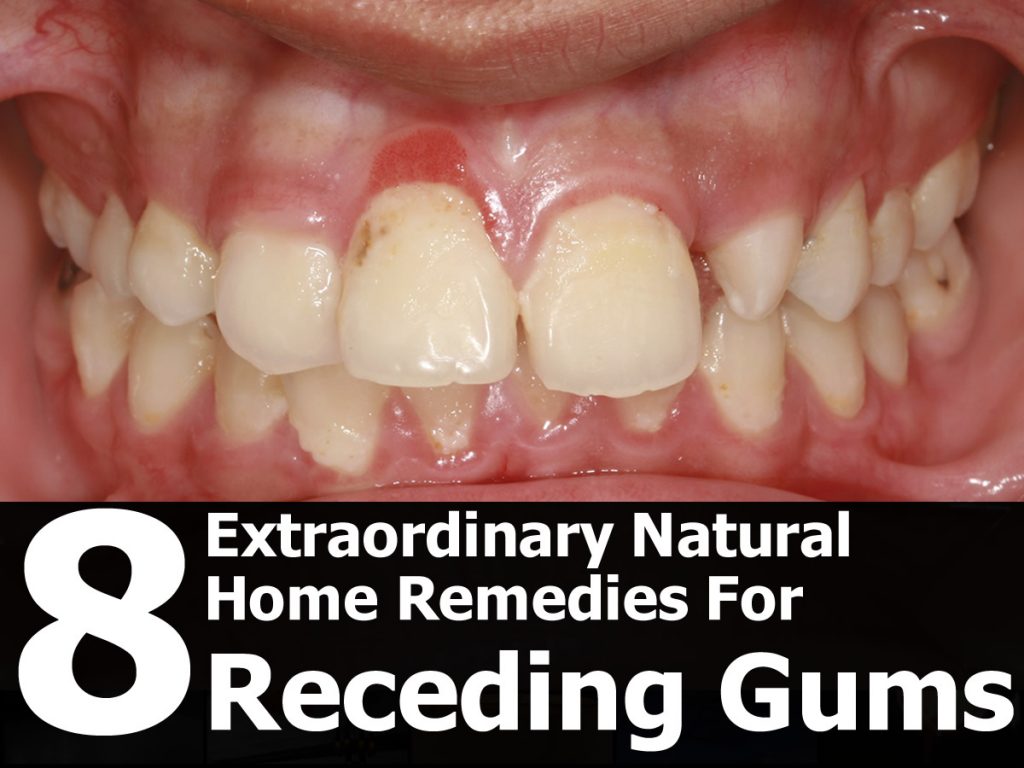
- Topical antibiotics. If gum recession is from periodontal disease, your dentist or hygienist will work with you on how to be more effective in cleaning your teeth. ...
- Dental bonding. Sometimes your dentist can camouflage the area of recession with tooth-colored composite resin. ...
- Orthodontics.
Is it actually possible to reverse receding gums?
The reality is you may not reverse receding gum however there are necessary treatments that can help. At the dentist, they will tell you if they start to notice that your gums are receding. They will tell you if it has progressed into a major problem or if it is just an emerging concern.
How to help receding gums grow back naturally?
This involves:
- gently brushing your teeth twice a day with a soft-bristled brush
- flossing in between your teeth daily before brushing
- going in for regular dental cleanings every six months
How to reverse receding gums naturally at home?
- Another very effective way to fix receding gums naturally is to mix 1 teaspoon of baking soda and a sufficient amount of hydrogen peroxide to form a paste.
- Place the paste on the fingers and rub the gums, let it act for a minute.
- Rinse mouth thoroughly to remove excess.
- Repeat 2-3 times in the week until improvement.
What is the procedure for fixing receding gums?
Why do gums recede?
- Periodontal disease. Periodontal disease is the infection and inflammation of gums and other tissues in the mouth. ...
- Forceful or incorrect brushing. As much as regular brushing is important for maintaining good oral hygiene, using incorrect brushing techniques can actually damage your teeth.
- Teeth grinding and clenching. ...
- Injury. ...

Why are my gums receding?
Multiple factors can lead to gum recession. In most cases, the cause is periodontal disease, which is a bacterial infection of gum tissue and the s...
How can I prevent gum recession?
Observing good oral hygiene is the best way to prevent gum recession. Brush and floss daily and get a dental checkup biannually. There are other th...
How can I make my gums healthier?
If you want to take better care of your gums and you don't yet have gum disease, you can ensure that your gums stay healthy by taking care of them...
What should my gums look like?
Let's begin with what exactly healthy gums look like — color isn't a sure-fire way to determine whether gums are healthy or not. You know how we al...
What are receding gums?
Gum recession refers to a condition in which gums draw back from the teeth, leaving the roots of your teeth exposed. This condition is also called...
Why do gums recede?
What causes receding gums in most people? There are a handful of reasons, including gum disease, forceful brushing, injury or teeth grinding. Let's...
How much does it cost to fix receding gums?
There are various treatments for receding gums. Sometimes you may have to combine multiple treatments. Have a look at the following table to see wh...
Can receding gums grow back?
‘Can receding gums be reversed?‘ is a common question regarding this condition. In short, no, receding gums cannot be reversed; nor can they grow b...
How to prevent receding gums?
The best ways to prevent receding gums include: Routine dental cleanings: These regular cleanings will prevent diseases and recession caused by bacterial and tartar buildup. Schedule one to two dental cleanings every year as brushing your teeth twice a day does not remove all the bacteria.
Why do my gums recede?
This habit requires medical attention and can be treated using a mouth guard, which is usually painless. Traumatic injuries on a tooth or gum tissue may cause receding gums. Poor oral habits: Poor oral health will lead to periodontitis, which in turn leads to receding gums.
How long does it take for teeth to heal from a bite splint?
In general, orthodontic treatment takes 12-24 months. Night guards or bite splints: Excess clenching, grinding and bruxism causes the enamel to chip, which leads to gum recession. Bite splints are an effective solution of how to fix receding gums. They reduce the strain on your teeth.
What essential oil is good for receding gums?
In addition, it can also help to prevent further recession and tooth decay. How: Use a quarter cup of warm sesame oil to swish your mouth. 3. Coconut Oil.
What essential oils are good for gum recession?
4. Tea Tree Oil. This essential oil prevents root damage and gum recession. The oil has antimicrobial and antifungal properties that destroy bacteria. It prevents plaque buildup in between your teeth. How: Dilute tea tree oil and use it to swish your mouth. Undiluted tea tree oil will cause burns. 5. Eucalyptus.
What to do for gum recession?
Antibiotics are prescribed in case the gums have an infection. The doctor may prescribe the following medication to treat the underlying conditions that is causing gun recession: 1 Enzyme suppressants 2 Antiseptic chips 3 Topical antibiotic gel 4 Anti-microbial mouthwash
How to get rid of bad breath after eating?
How: Chewing a clove after a meal removes bad breath and treats any oral disease. Alternatively, you can use one or two drops of clove oil to massage your gums for a few minutes. Use the remedy 1-3 times in a day. Consult your doctor if you are on blood clotting medication.
What Are Receding Gums?
Receding gums, also known as gingival recession, is the process where the gum tissue that protects and secures your teeth wears away. As it pulls back your gum line, it leaves your teeth and their roots exposed to bacteria and injury.
How Can You Stop or Reverse Receding Gums Naturally?
The best way to stop gum recession is with professional dental intervention. Modern dentistry has various ways that can help reverse your receding gum lines.
Surgical Solutions to Reverse Receding Gums
These home remedies are natural, cheap, and useful at stopping or reducing gum recession. However, the most effective way to target a receding gum line happens at the dentist.
Get LANAP Treatment in New York City
Gum recession is a serious issue, and fast intervention is crucial when you notice it. Otherwise, you risk painful inflammations and losing your teeth.
What causes gums to recede?
There are a number of factors that can cause your gums to recede, including: Periodontal diseases. These are bacterial gum infections that destroy gum tissue and supporting bone that hold your teeth in place. Gum disease is the main cause of gum recession. Your genes.
How do you know if your gums are receding?
Gum recession is not something you want to ignore. If you think your gums are receding, make an appointment with your dentist.
What is gum tissue graft?
After the regenerative material is put in place, the gum tissue is secured over the root of the tooth or teeth. Soft tissue graft: There are several types of gum tissue graft procedures, but the most commonly used one is called a connective tissue graft.
Why do my teeth recede?
Grinding and clenching your teeth. Clenching or grinding your teeth can put too much force on the teeth, causing gums to recede. Crooked teeth or a misaligned bite. When teeth do not come together evenly, too much force can be placed on the gums and bone, allowing gums to recede. Body piercing of the lip or tongue.
What happens if you leave a tooth untreated?
If left untreated, the supporting tissue and bone structures of the teeth can be severely damaged, and may ultimately result in tooth loss. Gum recession is a common dental problem.
How often should I see a dentist for gum recession?
Brush and floss your teeth every day and see your dentist or periodontist at least twice a year, or as recommended. If you have gum recession, your dentist may want to see you more often. Always use a soft-bristled toothbrush and ask your dentist to show you the proper way to brush your teeth.
Why do women have gum recession?
Fluctuations in female hormone levels during a woman's lifetime, such as in puberty, pregnancy, and menopause, can make gums more sensitive and more vulnerable to gum recession. Tobacco products. Tobacco users are more likely to have sticky plaque on their teeth that is difficult to remove and can cause gum recession.
How to prevent gums from receding?
Adopting the correct brushing technique can help prevent the gums from receding. Place the toothbrush against the gums at a 45 degree angle. Applying gentle pressure, sweep the toothbrush back and forth using small, tight strokes. Brush the outer and inner surfaces, as well as the chewing surfaces, of the teeth.
Why do my gums recede?
Periodontal disease may cause receding gums. Periodontal disease, or gum disease, refers to the infection and inflammation of the gums and other structures in the mouth. This inflammation occurs due to an accumulation of bacterial deposits called plaque.
What is gum graft surgery?
During GGS, a surgeon will take a small piece of gum tissue from elsewhere in the mouth and use it to cover the exposed tooth roots. GGS helps prevent bone loss and the gums from receding farther.
How to stop gum recession?
However, some treatments can reattach and restore gum tissue around the teeth. Maintaining good oral hygiene and attending regular dental checkups can help prevent, slow, or stop gum recession. People should talk to their dentist for tailored advice on preventing and treating receding gums.
How does gum recession occur?
Outlook. Healthy gums fit snugly around the visible part, or the “crown,” of the teeth. Gum recession occurs when the gums pull away or recede, exposing the roots below. Unlike the crown of the tooth, the roots do not have a protective enamel coating. This makes the exposed roots sensitive and prone to decay.
What causes gums to recede?
Periodontitis. Periodontitis is the later stage of periodontal disease and can cause the gums to recede. As the gum and connective tissues pull away from the tooth, a pocket forms between the tooth and gum, which begins to accumulate bacteria. Over time, the bacteria cause further inflammation.
How does root planing work?
These procedures remove plaque and tartar from below the gumline, where regular brushing cannot reach. Root planing removes plaque and tartar specifically from the roots of teeth. Afterward, a dentist will use special instruments to smooth the roots, which helps the gums reattach to the tooth.
Gum Disease and Gum Tissue
A serious gum infection, periodontitis, can damage the soft tissue and lead to tooth loss if not treated. Periodontitis can lead to teeth loosening or loss, but it is common and largely preventable.
Gum Recession
Gum recession is when your gum margins (the pink area) recede and expose more root surfaces. As the gum pockets deepen with receding gums, there are several treatments that a dentist may recommend for assistance in halting this progression. If left untreated, bleeding gums can cause loose teeth, tooth sensitivity, tooth loss, and tooth decay.
Gum Surgery
For more serious cases of receding gums, your dental surgeon may recommend gum surgery. There are several different types, including:
Natural Remedies For Receding Gums
Some people claim that several natural remedies can cure receding gums. The following remedies each have been shown to improve your oral health. Some of the most popular ones include:
how to get rid of receding gums naturally?
Gum recession is the most common issue that can lead to tooth loss! Nature's Smile is the best natural product on the market for gum recession with all-natural ingredients and a money-back guarantee. It's time to get your smile back!
